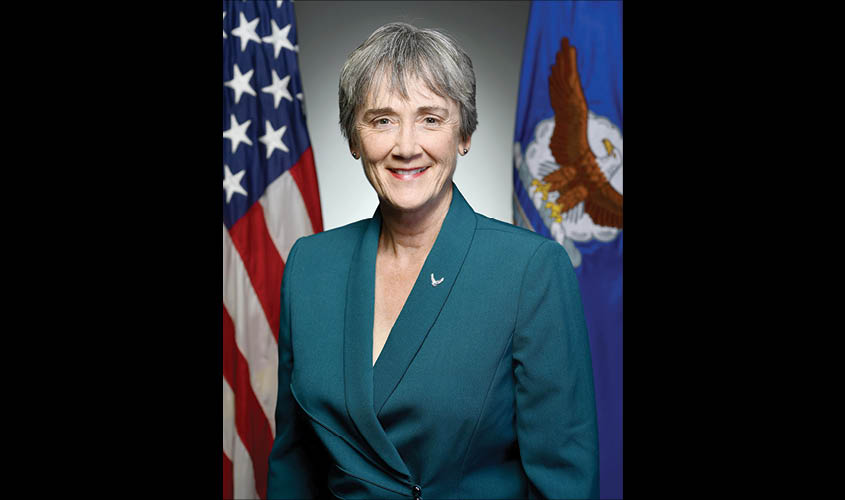Wilson gave reference to India’s Mission Shakti, saying about four weeks ago airmen at Buckley Air Force Base detected a missile launch off the coast of Odisha.
London: To mark the occasion of Policy Exchange’s new Space Policy Unit, the think-tank hosted US Secretary of the Air Force, Heather Wilson, for a talk about national security in space. Wilson oversees the US Air Force’s annual budget of more than $138 billion and directs strategy and policy development, risk management, weapons acquisition, technology investments and human resource management across a global enterprise; plus the oversight of America’s military space capability and in this capacity she has been at the heart of the debate over the Trump administration’s proposed Space Force.
Wilson opened her talk with a reference to India’s Mission Shakti, saying about four weeks ago airmen at the 11th Space Warning Squadron at Buckley Air Force Base, Colorado detected a missile launch from Abdul Kalam Island, off the coast of Odisha. Wilson said the missile flew for three minutes before making impact with an Indian military observation satellite, 300 km above the earth’s surface. Three minutes from launch to impact at low earth orbit clearly made an impression. The Combined Space Operation Centre at Vandenburg, California, immediately began tracking and cataloguing about 270 pieces of space debris about 10 cm in diameter. Tracking the world’s space debris has been a US Air Force mission since the 1960s. The US warns those at risk when a piece of debris might collide with their satellite, including the Chinese. Wilson commended the US missiles warning satellites and UK’s Royal Air Force partnership in this, jointly operating the Ballistic Early Warning Radar at RAF Fylingdales, Yorkshire.
So far US has provided a utility service to the world, including satellites that predict weather, enable Presidential communications and the atomic clock on the GPS satellite that is the timing signal for the NYC Stock Exchange, noting that the 40 American airmen who provide this service to a billion people every day have an average age of 22 years. Satellites also operate launch facilities for civil and military use. In the 21st century this role has expanded to defend and fight for the provision of these services. In March the attendance at the Space Symposium in US was testimony that space is becoming a common domain for human endeavour, space is now more accessible and more useful to emerging nations. Wilson said that potential adversaries (China and Russia) are developing capabilities that would deny US the use of space during an emergency, therefore US has changed strategies to remain dominant in a contested rather than benign space environment. Wilson argued US preparedness to fight and win any battle in space. She said deterrence is still the goal but left the audience in no doubt of the US sincerity of retaining pre-eminence. US and partner allies are fine-tuning defence and fighting capabilities, developing a multi-dimensional strategy and complicated dilemmas to create adversarial doubt. Space, sea, air and land components can be co-ordinated rapidly by specially trained teams. Wilson quoted former Secretary for Defence James Mattis: “Nations with allies thrive and those without wither.”
Wilson referred to the results of the recent Shriever War Games, which examined what a space engagement in 2028 would look like and how a coalition of allied nations (including Japan) would respond in a multi domain conflict. The US Air Force has opened education and training opportunities at the National Security Space Agency for current and emerging partners to create space professionals. She stressed the importance of people and the emergence of new ideas to synchronise progressive thinking between partners and allies.
Wilson acknowledged UK scientists’ and engineers’ long-term contribution in space, quoting Black Knight, Black Arrow, Cassini Mission, Galileo and the Mars Rover being tested in the Chilean desert. The United States Air Force Office of Scientific Research in London continues its collaboration and funding with British universities to further improve space situational awareness, observation and solutions.
This reporter requested Wilson to talk about US-India space collaboration and whether India might be included in Five-Eyes. Wilson replied that Six-Eyes were unlikely in the short term, but that US was seeking to engage with aspirant space faring nations in a positive way. The Space Policy Institute has talked privately about the need to establish norms of behaviour in space. These were originally derived from the norms of the sea and need updating. A plan for deorbiting dead satellites, space traffic management, space conflict resolution and the obligation to minimise debris are conversations to be had with any space faring nation.
Wilson said with the exception of cyber, attribution does not pose such a challenge in space as it is little known that the National Reconnaissance Office is a joint operation between the Air Force and the CIA. Brexit will not make a difference to US relationships with either UK, France, Germany or the EU.
Lord David Willetts has observed a shift in UK’s approach to space in that UK is no longer a recipient of US data and support but a developer of autonomous capabilities that can be shared. Chris Skidmore, UK Space Minister, wants to make sure that the priorities of civil contingencies, military, earth observational capacity, space exploration, satellite and commercial opportunities are aligned. He said, “Should we be creating a National Space Council for the UK along the same lines as the US?”

